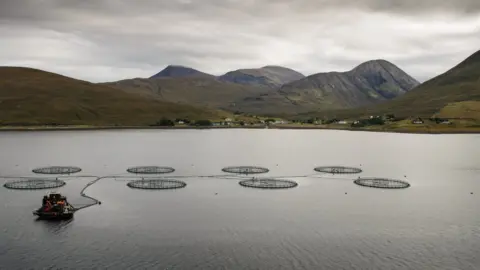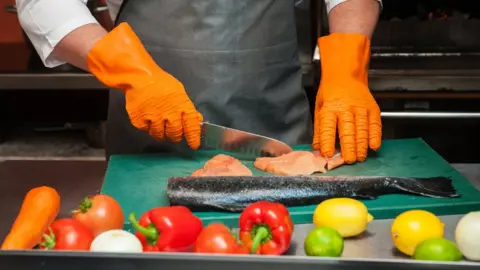Scottish salmon farming petition signed by 30,500
 Getty Images
Getty ImagesMore than 30,500 people have signed a petition urging the Scottish government to routinely test effluent from salmon processing plants for diseases.
Campaigners claimed that some polluted waste water contained pathogens that could "threaten" wild salmon stocks.
The Scottish government said the risk of disease transfer from farmed salmon to their wild counterparts was "low".
An industry body said fish farms worked to "strict regulations" on marine biosecurity.
Currently neither the Scottish Environment Protection Agency (Sepa) nor the Scottish government tests the waste water from salmon farms or processing plants for pathogens and diseases.
Self regulation
But lobby group Scottish Salmon Watch insisted that the current situation amounted to industry self regulation - which they claimed was "irresponsible".
This year a damning report by Holyrood's environment committee found that the sector was not being regulated "sufficiently" or "effectively".
Last year footage was released that showed treated "blood water" being released from a fish processing plant into Canadian waters where wild salmon spawn.
The discharge later tested positive for pathogens potentially harmful to fish: PRV and Piscirickettsia salmonis bacteria.
The Canadian case prompted SumOfUs, a website "fighting for people over profits", to organise a petition calling on the Scottish government and Sepa to carry out tests on any treated effluent that is discharged in Scottish waters.
Sondhya Gupta, senior campaigner at SumOfUs, said: "After we took action there, the Canadian fisheries minister amended the Fisheries Act to reinstate environmental protections.
"The situation in Scotland is just as urgent - people all over the UK want to see Scottish wild salmon protected too."
Related employment
Farmed salmon is Scotland's single biggest food export - worth £600m - and is estimated to provide nearly 2,500 jobs with thousands more supported by the aquaculture sector in rural and coastal communities.
But it has faced continuing problems with tackling high fish mortality rates and parasitic sea lice which attach themselves to the skin of the fish and can be transferred to passing wild salmon.
Scottish Salmon Watch director Don Staniford said: "In view of the recent results of positive tests for viruses in effluent water in Canada it is incumbent upon the Scottish government and Sepa to follow suit.
"It is shockingly irresponsible that the Scottish government does not even test for any pathogens in processing plant or salmon farm effluent."
 Getty Images
Getty ImagesIndustry body the Scottish Salmon Producers Organisation (SSPO) said farmers already worked to strict regulations to ensure that they operate to "high standards".
SSPO chief executive Julie Hesketh-Laird said that fish health was monitored "daily" at every salmon farm in Scotland, with their performance audited by the Scottish Government's Fish Health Inspectorate and Sepa.
She added that they were committed to protecting Scotland's environment and to ensuring risks are managed appropriately.
Sepa said its remit did not include testing the waste water from salmon farms for pathogens and diseases - adding that the Fish Health Inspectorate is responsible for fish diseases surveillance.
'Strengthen regulation'
Anne Anderson, chief officer, Compliance and Beyond, at Sepa said: "Aquaculture is a nationally important industry for Scotland and Sepa has an important role in regulating the environmental impacts of this industry.
"Along with others, we are committed to protecting and enhancing Scotland's environment and to working with the sector, with NGOs and other stakeholders regarding its sustainable performance.
"In July we launched a consultation on our intention to strengthen the regulation of the sector. The consultation included a review of the Environmental Quality Standard for Slice [anti-sea lice medicine] where we called for evidence on its use to help inform future regulation of medicines used in the marine environment.
"This closed on 30 September. We have reviewed the responses and are now finalising our aquaculture sector plans which are to be published in the coming months. We will continue to regulate this important Scottish industry to ensure it uses sustainable practices to protect Scotland's marine environment."
A Scottish government spokesman said: "The Scottish government does not conduct testing of salmon farm wastewater.
"The risk of disease transfer from farmed salmon to their wild counterparts is low. Where listed diseases are found on farmed salmon, wild fish in the vicinity are routinely sampled to determine their health status and confirm no negative effect."
"We are committed to protecting Scotland's environment and to ensuring risks are managed appropriately."
Earlier this year a Freedom of Information request made to the Sepa revealed a salmon packing factory in Shetland had leaked "untreated" blood water into the sea - which the company has denied.
